Do Junior World Medals Mean Senior World Medals In The Future?
Do Junior World Medals Mean Senior World Medals In The Future?
An analysis of United World Wrestling Junior and Senior World Championships.
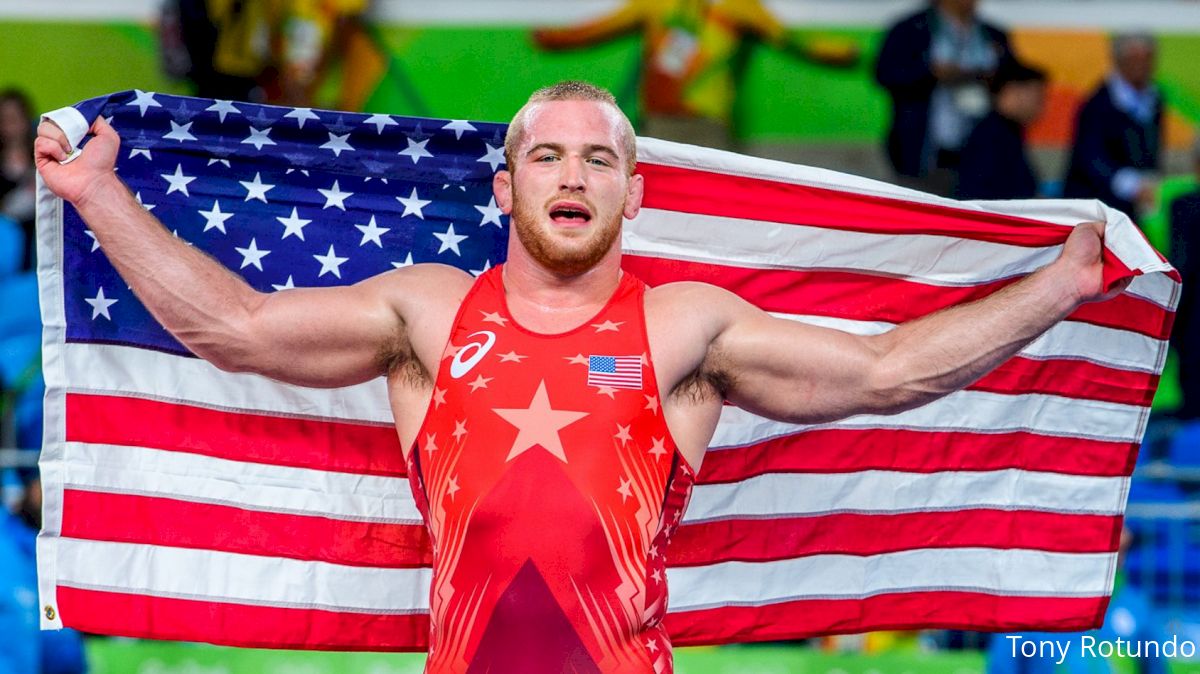
Unlock this article, live events, and more with a subscription!
Already a subscriber? Log In
The Junior World Championships are widely regarded as a top event (regardless of age group) in the world each year, and for good reason. Many future champions and medalists fill the brackets each year. The question we answer here is: Do medals at the junior level translate to senior level medals?
When speaking to international wrestling fans and coaches I got the impression that many felt there was a very strong correlation between junior medals and success at the senior level. Heading into the research I thought the perception was grossly overestimating how many junior medalists actually earn a senior level medal. However, that wasn’t the case when I looked to Twitter for answers.
Junior medals convert to senior medals in men’s fs
— Sockobuw (@sockobuw) August 28, 2019
Wrestling twitter picked the correct conversion percentage and didn’t overestimate as I predicted from anecdotal evidence. I used the Junior World Championships from 2003 to 2013 for ten years of data. During this timespan there were always eight weight classes and 4 medalists at each weight, except for 2003 that had a true bronze. There was not a championship held in 2004. I chose this timeframe because it’s modern era and still gave most of the junior medalist ample time to earn senior level medals. It took Adam Batirov 15 years to finally earn a senior level medal after he earned silver at the 2003 Junior World Championships. So there will definitely be more medals earned and the data will have to be updated, but I felt it was the best data set available.
Junior medalists in the 10 championships analyzed went on to win a medal on the senior level approximately 22% of the time. The data did not account for multiple time medalists being counted multiple times. There are examples of multiple medalists earning a senior medal and others that did not earn a senior medal. so the difference is virtually negligible. Arslanbek Alborov (AZE), Toghrul Asgarov (AZE) and Vladimir Khinchegashvili (GEO) are examples of multiple time junior medalists that earned senior medals. Ahmet Peker (TUR) and Magomed Magomedaliev (RUS) were both multiple time champions at 50kg that never earned a senior medal. As most would expect, 50kg medalists turned into senior level medalists most infrequently. Only Sulyman Atli (TUR) and Vladimir Khinchegashvili (GEO) earned 50kg medals and then went on to a senior medal. Khinchegashvili also earned back-to-back Junior World titles up at 55kg. From an American perspective, can Spencer Lee defy long odds of 50kg junior medalists to earn a senior medal?
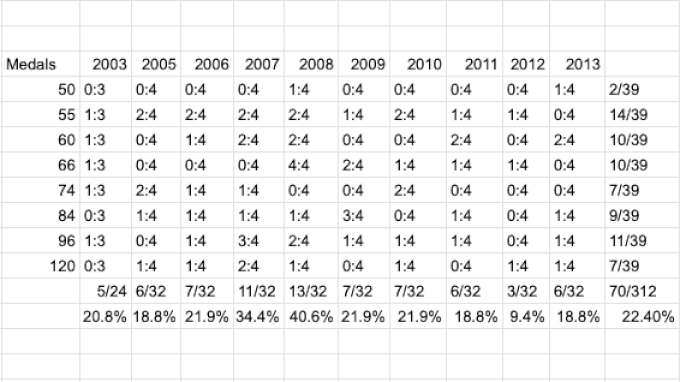
Along with looking at medalists I broke down how successful Junior World Champions were at earning senior level medals. As one would assume, champions faired better at the next level 45% of champions went on to earn senior level medals. If you throw out the defunct 50kg weight class, half of the champions earn medals at the next level. These wrestlers often don’t just medal, but they continue to reach the top step of the podium. Just over 20% earn a senior world title.
N= no medal
Y= senior medal earned
C= senior world champion
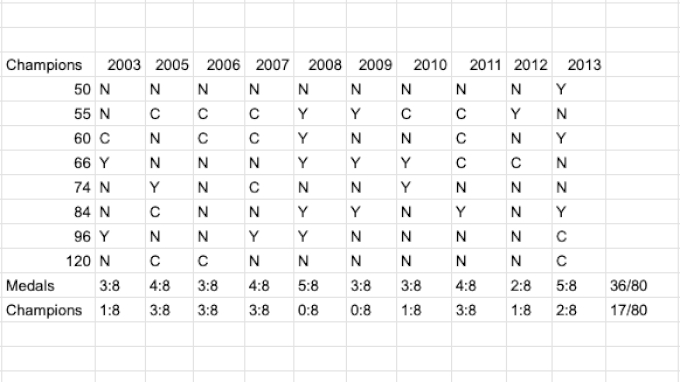
I also analyzed junior medalists from this timeframe that competed for Russia and the United States. Russia earned 56 medals at these ten championships. That is an amazing number. In 2008 Russia earned seven medals in eight weight classes and had six champions. Four of those medalists earned a senior level medal. Russia as a whole earned medals on the next level at a rate that more than double the rest of the world. 22 of 56 junior medalists went on to win senior medals for Russia. That’s 39.3% for the Russians. The rest of the world converted 48 of 256 medals, for an 18.8% rate.
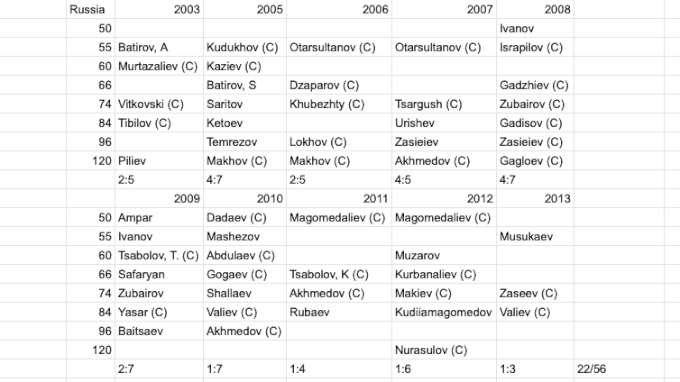
This rate went against my prediction for Russia as it is more difficult to navigate the tremendous depth to get on the Russian team. Batirov (BRN), Zasieiev (UKR), and Safaryan (ARM) earned medals for countries other than Russia. This will continue to be more prevalent as transfers have become more fashionable in recent years. Saritov and Ketoev earned medals for Russia, but are currently competing for other nations.
The United States converted 3 of 16 medals during this span. All three medalists earned world or Olympic titles on the senior level. Henry Cejudo was silver to Otarsultanov (RUS) just two years before his Olympic victory in Beijing. Otarsultanov would earn his Olympic gold medal in 2012 after being held off the team after his back-to-back Junior World Championships. Logan Stieber earned a non-Olympic World Title in 2016 after coming up just short at the 2011 Junior World Championships when he was bested by Asgarov (AZE). Kyle Snyder earned a Junior World Title in 2013 and accomplished the feat on the senior level just two years later.
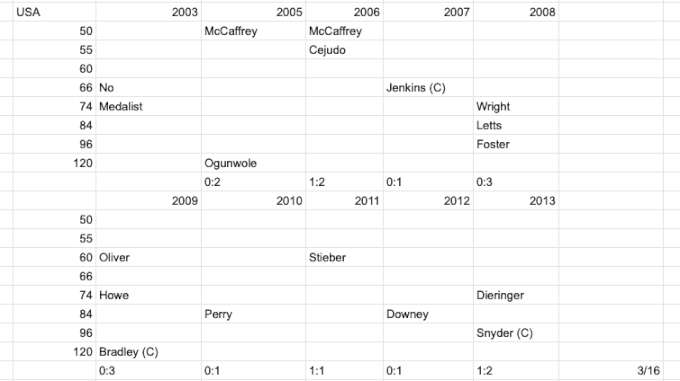
This might bode well for Pat Downey as he will be the only other junior world medalist to earn a spot on the senior World Team from this timespan. The overall conversion for the United States is on par with the rest of the world when Russia is excluded. The data from 2014-present will be interesting to track for the United States as junior medals have been earned more frequently.
Author’s Note: There are still several UWW database errors and the data used could be flawed due to multiple and unlinked profiles. I found two junior profiles that had errors and I was able to make the correction. Alejandro Valdes Tobier and Albert Saritov have linked junior profiles that do not have their senior level credentials. I believe I found the only two errors, but can’t say with 100% certainty.